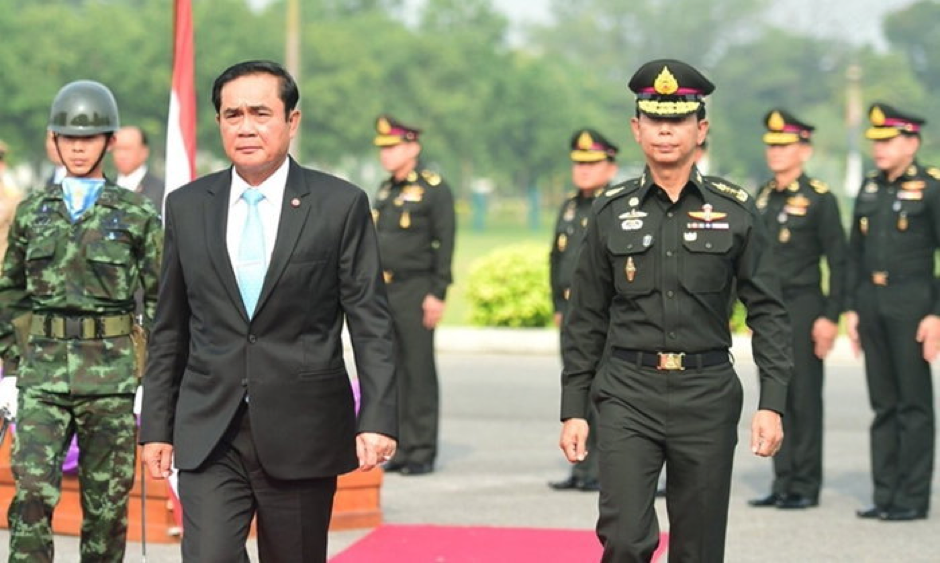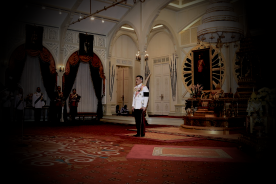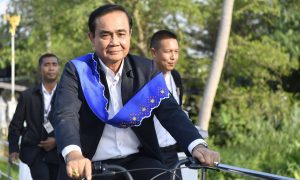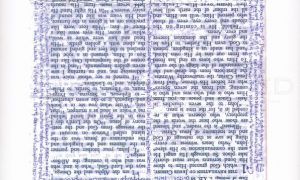When Gen. Prayuth Chan-ocha, retired from the army, became civilian prime minister in July 2019, one could have argued that his influence across the armed forces was assured for years to come. Thailand’s 5 September 2019 announcement of the 1 October armed forces reshuffle demonstrates that such an assumption is not well founded. In fact, Thai military leadership is increasingly in transition. Persistence and change in military hierarchy are often best reflected in such appointments. Thailand’s annual reshuffle for 2019 is no different. 871 appointments (18 of which are women) involved 563 officers of at least the rank of Major General (Army), Rear Admiral (Navy), or Air Vice Marshal (Air Force). The appointments shape the leadership of the country’s top-heavy armed forces, in which there are approximately 1700 generals out of a total of 360,000 troops, for a proportion of one general for every 212 soldiers.
Traditionally, the reshuffle originated from the commanders of the three military services (the army, navy and air force) and the commander of the joint Thai armed forces. The promotions, demotions and reassignments of individuals and factions across the armed forces are then to be endorsed by the prime minister and king before becoming law. In 2008, an amendment to the Defence Act mandated that a vote by a committee composed of the three service commanders, the Thai armed forces commander, the Permanent Defence Minister (a military post) as well as the Defence Minister and optionally the Deputy Defence Minister would determine the assignments of the top generals. This development enhanced the clout of the active-duty military vis-a-vis elected civilians.
Reshuffling and appointments at senior echelons of the armed forces also increasingly extend networks favoured by and loyal to the new monarch. This year’s reshuffle of the five senior-most Armed Forces “Tigers” (including the police chief) only rotates one chief, Thailand’s air force commander. Replacing retiring palace favourite Air Chief Marshal (ACM) Chaiyapruek Didysasarin is ACM Manath Wongwat. Manath is part of a clique of Air Force senior officers who once served as Thai military attachés in Germany (including three other recent air force commanders). The connection to Germany is useful for Thai air force goings-on in Munich. Manath is also a proponent of purchasing Swedish Gripen fighter jets, a standpoint shared by his patron, the Privy Councilor and retired ACM Chalit Pukbhasuk.
Another interesting appointment at this level is that of Gen. Chalermpol Srisuwat to the post of the Chief of the Joint Staffs of the Royal Thai Armed Forces. Like ultra-arch-royalist Army Chief Gen. Apirat Kongsompong, Chalermpol previously helped to lead the King’s Royal Rachawallop 904 Special Military Task Force. He is an avid King’s man and will likely become the next commander of the Royal Thai Armed Forces after Gen. Pornpipat Benyasiri retires in 2020.
Perhaps the most powerful armed forces tiger is Adm. Luechai Ruddit—his older brother is Privy Councilor Kampnat Ruddit. Luechai has succeeded in gaining more budgeting for the navy for the first time since the navy was defunded following a 1950 navy coup attempt. Luechai has specifically pressed for Chinese naval vessels, including three Chinese-made submarines. Regarding Police Chief Gen. Jakthip Chaijinda, though he is closely affiliated with Deputy Prime Minister Gen. Prawit Wongsuwan, he must retire in 2020.
Five Armed Forces “Tigers” (Senior-most armed forces officers)
| Position | Name | Faction
(Class, Unit) |
Retires |
| Commander, Royal Armed Forces of Thailand | Gen. Pornpipat Benyasiri | 18, Wongthewan | 2020 |
| Army Commander | Gen. Apirat Kongsompong | 20, Wongthewan | 2020 |
| Navy Commander | Adm. Luechai Ruddit | 18, Ruddit | 2021 |
| Air Force Commander | ACM Manath Wongwat | 20, Germany | 2020 |
| Police Commander | Pol. Gen. Jakthip Chaijinda | Police Class 36, Wongsuwan | 2020 |
Because the lion’s share of budgeting and firepower goes to the Royal Thai Army as opposed to other military services, let’s focus on it. When it comes to army unit factionalism, the preponderance of power in the 26 senior army posts falls predominantly in favour of the Wongthewan (1st Infantry Division Kings Guard) clique, followed by the Pawai (Special Forces) faction, then the Sua-dam (9st Infantry Division) faction, and finally—with only three posts following this 2019 reshuffle—Buraphapayak (2nd Infantry Division Eastern Tigers). Buraphapayak is the faction membered by junta leaders Gens. Prayuth Chan-ocha, Prawit Wongsuwan and Anupong Paochinda. The Queen’s Tiger Guard is a sub-faction within Buraphapayak representing the 21st Infantry regiment which Anupong and Prayuth once commanded. It dominated the army leadership from 2007 until 2016.
But under Thailand’s post-2016 regal potentate, Wongthewan has ascended to be the favoured clique. Wongthewan leader Apirat became Army Chief in 2018. The 2019 reshuffle demotes Buraphapayak’s senior-most active duty officer, Assistant Army Chief Gen. Kukiat Sinaka, to the post of Deputy Permanent Minister of Defence. Buraphapayak has zero members in the Army Five Tigers for the first time since 2003.
A rebuke against a sister and the personalising of monarchical control
Paul Chambers on King Vajiralongkorn's expanding control over state forces
Within the Army Five Tigers, Gen. Apirat Kongsompong remains army commander and will retire in 2020. Fellow Wongthewan Deputy Army Chief Gen. Natapol Nokpanit, a chum of Apirat, retires the following year (Natapol could possibly be promoted to Army Chief for one year). Continuing on as army chief of staff this year is Gen. Teerawat Bunyawat, a member of the Sua Dam [Black Panthers] faction. Teerawat is important because he runs the day-to-day operations of the anti-insurgency agency, the Internal Security Operations Command (ISOC).
The 2019 reshuffle leaves the Army Five Tigers with two new appointments. First, Gen. Sunai Prapuchanei, a member of the Pawai (Special Forces) faction who is close to Privy Councilor retired Gen. Chalermchai Sittisart, takes the post of assistant army commander. Second, 1st Army Chief Gen. Narongphan Jitkaewthae, a Wongthewan faction officer considered extremely close to the monarch and a former commander of the Royal Rachawallop 904 Special Military Task Force, is becoming the other assistant army commander in replacement of Gen. Kukiat. Upon Apirat’s retirement in 2020, Narongphan will likely become his successor. Narongphan does not retire until 2023, meaning that his tenure as army commander will be relatively long for modern Thai army chiefs. His rabid arch-royalism will help to further entrench royal absolutism over Thailand’s armed forces.
Five Army “Tigers” (Senior-most army officers)
| Position | Name | Faction
(Class, Unit) |
Retires |
| Army Commander | Gen. Apirat Kongsompong | 20, Wongthewan | 2020 |
| Deputy Army Commander | Gen. Natapol Nakpanit | 20, Wongthewan | 2021 |
| Army Chief of Staff | Gen. Teerawat Bunyawat | 19, Sua-Dam | 2020 |
| Assistant Army Commander | Gen.Sunai Prapuchanei | 21, Pawai | 2020 |
| Assistant Army Commander | Gen. Narongphan Jitkaewthae | 22, Wongthewan | 2023 |
Let us turn finally to the all-important First Army Region army command, which is significant because of its close proximity to Bangkok where potential coups d’état are facilitated or foiled. With Wongthewan faction’s Gen. Narongphan having been appointed into the Army’s Five Tigers, Lt. Gen. Thammanoon Withi takes his place as first army commander. Thamanoon is a member of the Buraphapayak faction, but has held a leadership role in the King’s Royal Rachawallop 904 Special Military Task Force and so might be classified as a “Burapha-thewan”. At the same time, since 2012, Buraphapayak and Wongthewan have balanced their factional power in the First Army Region by swapping the first army region commander post every other year. In 2019, it is Buraphapayak’s turn to take the post. Under Thammanoon are a cohort commander and three deputy first army chiefs, all three of whom are Buraphapayak officers. One would think that the enormity of Buraphapayak commanders within the First Army Region command would keep the Wongthewan chiefs at bay. But the King’s support for Wongthewan has ensured that that faction remains at the top of the army.

Thai Army Rising Stars: Gen. Narongphan Jitgaewthae, Gen. Lt. Gen. Songwit Noonpakdi

Thai Army Rising Stars: Gen. Thamamoon Withi
Only one Wongthewan in fact serves in the First Army Region: Lt. Gen. Songwit Noonpakdi. The fathers of Songwit and Army Chief Gen. Apirat were leaders of the 1991–92 junta, and the sons are close as well. It is probable that Songwit will follow Narongphan in the Wongthewan-dominated promotion line towards becoming army commander. Meanwhile, another possible future Wongthewan army chief, Col. Songpao Satsao-ngern, is replacing Songwit as commander of the 1st Infantry Regiment King’s Guard, a unit under close regal authority.
Five Army First Region “Tigers” (Senior-most army officers)
| Position | Name | Faction
(Class, Unit) |
Retires |
| First Army Commander | Lt. Gen. Thammanoon Withi | 22, Buraphapayak/
Wongthewan |
2021 |
| Cohort Commander | Gen. Jaroenchai Hintao | 23, Buraphapayak | 2023 |
| Deputy First Army Commander | Lt. Gen. Songwit Noonpakdi | 24, Wongthewan | 2024 |
| Deputy First Army Commander | Lt. Gen. Suwit Ketsiri | 23, Buraphapayak | 2023 |
| Deputy First Army Commander | Lt. Gen. Suksuwan Nongbualang | 23
Buraphapayak, |
2023 |
Ultimately, Thailand’s armed forces are undergoing fundamental changes and the 2019 reshuffle only represents the tip of the iceberg. First, in the all-powerful army, Wongthewan has replaced Buraphapayak as the leading faction. Wongthewan will likely dominate senior army positions for years to come. Second, Prayuth and Prawit are government ministers today with less and less senior brass loyalists in the military. They have lost direct control over soldiers on the ground, forcing them to rely on Wongthewan’s Army Chief Apirat to guarantee security. Not since 2016 has there been a Buraphapayak Army Commander from whom Prayuth and Prawit could command loyalty. Third, the palace under the new reign has been quite successful in centralising its control over the armed forces, especially the army and air force.
Despite intense factionalism across all the armed forces, the senior military leadership coheres in its loyalty to the monarch. Wongthewan, the army clique most identified with Thailand’s sovereign, has become a mere monarchical mechanism. Following palace orders, several military units have been transferred just outside of Bangkok. The move was perhaps motivated by a belief that military units located in Bangkok—the centre of Thai monarchical authority—could somehow, someday endanger it. Only the Royal Rachawallop 904 Special Military Task Force and Royal Infantry 1st Division—units under direct palace control—will remain in Bangkok: they are being transformed into a Royal Command Guard. Clearly, in 2019 Thailand’s regal institution exercises ever-absolutist control over the armed forces.
 Facebook
Facebook  Twitter
Twitter  Soundcloud
Soundcloud  Youtube
Youtube  Rss
Rss 



